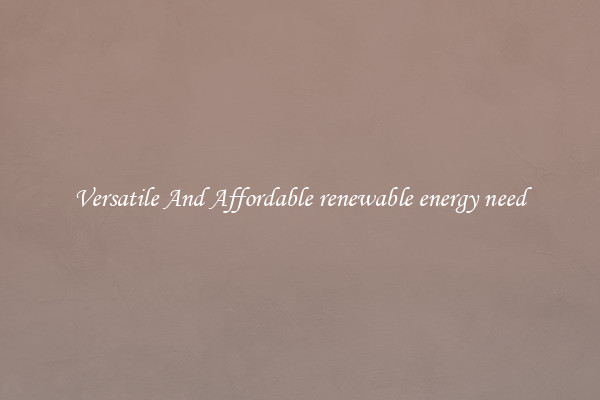Versatile And Affordable renewable energy need
Renewable energy is becoming increasingly popular as the world seeks to reduce its reliance on fossil fuels and combat climate change. One of the key advantages of renewable energy sources is their versatility and affordability.

Solar power, for example, can be harnessed in a variety of ways, from large-scale solar farms to small rooftop installations on residential homes. This flexibility makes it a versatile option for generating electricity in a wide range of settings. Additionally, the cost of solar panels has dropped significantly in recent years, making it an increasingly affordable choice for consumers and businesses alike.
Wind power is another versatile and affordable renewable energy source. Wind turbines can be installed on land or offshore, making it a viable option for locations with varying geographic features. While the initial cost of installing wind turbines can be high, the operational costs are relatively low, making wind power a cost-effective choice in the long run.
Hydropower, geothermal energy, and bioenergy are other examples of renewable energy sources that are both versatile and affordable. Hydropower, which harnesses the energy of flowing water, can be generated through large dams or smaller run-of-river projects. Geothermal energy uses heat from beneath the Earth's surface to produce electricity and heat buildings, while bioenergy is derived from organic materials such as wood, crops, and waste.
The versatility of renewable energy sources allows them to be used in a variety of ways to meet different energy needs. Solar panels can provide electricity to homes and businesses, while wind turbines can generate power for entire communities. Hydropower can be used to generate electricity and provide irrigation for agriculture, while geothermal energy can be used for heating and cooling buildings.
In addition to their versatility, renewable energy sources are becoming increasingly affordable. Advances in technology and economies of scale have driven down the cost of solar, wind, and other forms of renewable energy, making them competitive with traditional fossil fuels in many markets. Governments and businesses are also investing in renewable energy to take advantage of cost savings and environmental benefits.
In conclusion, versatile and affordable renewable energy sources are essential in the transition to a more sustainable energy future. With the increasing availability and affordability of renewable energy options, it is becoming easier for individuals, businesses, and governments to reduce their carbon footprint and contribute to a cleaner, greener planet. Investing in renewable energy now can help pave the way for a more sustainable and prosperous future for generations to come.

View details

View details

View details

View details








